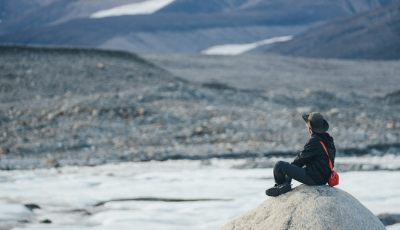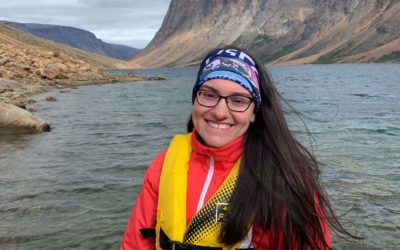This interview is made possible with support from the Natural Sciences and Engineering Research Council of Canada.
As the Arctic warms two to three times faster than the rest of the planet, the increasingly rapid melt of ice and snow are having significant impacts on the behavior of wildlife. Similarly to polar bears living on top of the ice in winter, lemmings and voles living under the snow are also seeing changes that they will have to adapt to. Can the tiny rodents succeed?
Join us to hear Canadian Museum of Nature scientist Dominique Fauteux talk about the impact of a changing Arctic on small mammals. Hosted by SOI Arctic 2015 alum Camille Morin.
About Dominique Fauteux
Dominique Fauteux is a research scientist in zoology for the Canadian Museum of Nature.
Dominique’s research aims to better understand the workings of terrestrial ecosystems using micro-mammals. Animals in this group of species have often been identified as key players because of their central role in food webs and terrestrial food chains. Small mammals are central to Northern ecosystems and their fluctuations in abundance, whether cyclical or irregular, lead to pulsations of biodiversity. Dominique tries to elucidate the mechanisms of these fluctuations through empirical studies using field observations and museum collections.

About Camille Morin
Camille Morin works for Parks Canada as a knowledge mobilisation advisor with the Chief Ecosystem scientist team where she supports Parks Canada scientific interests such as scientific integrity policy and evidence informed decision making. She was introduced to the Arctic as an undergrad student in biology collecting data on Greater snow goose ecology in Sirmilik National Park, Nunavut. Camille had the opportunity to travel with Students on Ice on the 2015 Arctic Expedition as a member of the Parks Canada Northern Engagement and Outreach Team. She then worked on the Canada Goose Arctic Gallery at the museum of nature as a content developer. Camille has obtained a Master’s degree in Biological Sciences from the University of Québec à Rimouski specialising in Arctic fox reproduction.

DISCOVER MORE
Climate Action Cohort Reflections
Focused on building climate leaders, the CAC brings together 10 Canadian youth alumni each year to bridge the gaps between policy decisions,...
“To me, Arctic policy is a way to build a better future for the North”
Veronica Flowers, Arctic 2017 alum from Hopedale, Nunatsiavut, shares her reflections on gaps she sees in her community when it comes to policy,...
Join the conversation! Nuiana and Heidi want to hear your thoughts on youth engagement in policy
Nuiana Hardenberg recently participated in the Arctic Youth panel at the 2021 EU Arctic Forum and Indigenous Peoples’ dialogue. She will be joined...





